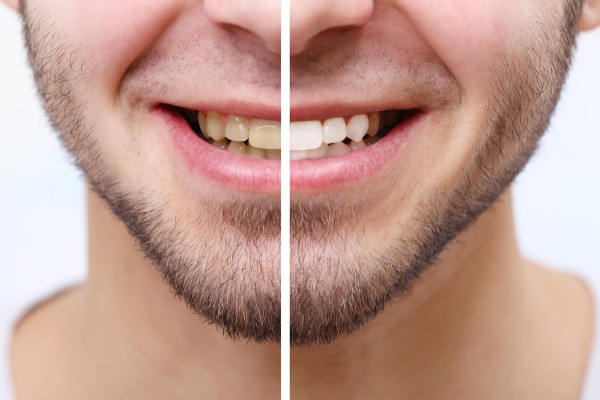Numerous surveys taken among dental patients have reiterated the fact many times that the one thing people are most concerned about is their smile. Everyone is aware of the social value of having a white, brilliant smile to impress others you come in contact with. It’s also one of the first things noticed at the beginning of a relationship between two people. Needless to say, there are a number of reasons why people place so much value on having white teeth and a dazzling smile.
Most people are also aware that if their smile is less than perfect, there are whitening options which can be coordinated with your dentist. Using a relatively inexpensive procedure, your teeth can be whitened in as little as two or three sessions, often applying peroxide solutions to achieve maximum whiteness. But can the same results be obtained through natural teeth whitening? Natural teeth whitening refers to the process of using methods such as foods and beverages to achieve a whiter and more appealing smile. If you’ve been wondering whether natural teeth whitening can give you the results you’ve been hoping for, keep reading below.
Pro – Apples and celery
Munching on firm fruits and vegetables such as apples and celery can help to remove a lot of surface plaque and stains before they have a chance to build up. By making such produce part of your daily diet, you can go a long way toward maintaining whiter teeth, and better health in general. Keep in mind that not all fruits and vegetables have the same kind of usefulness in cleansing the mouth. If you have any questions about specific foods, it’s best to consult with your dentist at a regularly scheduled appointment.
Pro – Peroxide rinses
You may remember from above that dental professionals will often use peroxide solutions to accomplish teeth whitening during office visits. That should be a pretty good clue that a peroxide rinse would also be effective at home for achieving that white smile you’ve always wanted. You can find peroxide solutions at your local drugstore, and you should read all directions carefully before attempting usage. In general however, you can achieve good results using a 3% peroxide solution twice daily, as a rinse for your mouth.
Pro – Over-the-counter whiteners
If you decide that home remedies are not potent enough or not fast-acting enough to suit your taste, you may be inclined to check out options at the local drugstore. If you do that, make sure to check the ingredient list on any teeth whitening alternative you’re considering. The rule of thumb should be to disqualify anything which has acid content, while favoring products which have a peroxide base. Other than that, you can still observe some general practices which contribute powerfully toward having a healthy, white smile. Drinking lots of water, having a healthy diet, and doing regular flossing and brushing will all help to keep your smile healthy and bright.
Con – Lemons and strawberries
To emphasize the point made above with regard to fruits and vegetables, lemons and strawberries can provide mixed results with teeth cleaning. Strawberries, lemons, and many other types of citrus fruit all have various levels of acid in them. Initially, this can help you to achieve a whiter smile, because that acid will eat away at discoloration and plaque. Over a period of time however, the acid will also eat away at your teeth’s enamel, and that will begin to cause problems with your dental health. One practice you should especially avoid with these kinds of home remedies, is rubbing your teeth directly with juices from them.
Pro and Con – Baking soda, vinegar, activated charcoal
Enamel is the super hard coating on your teeth which is the first line of defense against decay and cavities. When that enamel has been removed or worn out, teeth are more susceptible to attack. Anything which acts to degrade or erode the enamel surfaces of teeth does much more harm than good. Into this category fall such home remedies as baking soda, vinegar and activated charcoal.
Baking soda does initially help to clean teeth because it’s a mild abrasive, but the downside of using baking soda to clean your teeth is that while it scrubs away stains, it can also scrub away the enamel of your teeth. Although much has been written about drinking or gargling with apple cider vinegar can whiten your teeth and kill bacteria, the truth is that it can be very harmful for your teeth. Because it has a very high acidic content, vinegar can literally eat away at tooth enamel and expose your teeth to accelerated decay.
Activated charcoal falls into this same category. This substance is referred to as ‘activated’ charcoal, because its absorptive qualities have been enhanced, and those qualities allow it to theoretically absorb bacteria, germs, and stains when used in place of toothpaste. However, the American Dental Association advises against using this teeth-whitening method, because it can have the same long-term harmful effect on tooth enamel.
The bottom line on home remedy natural teeth-whitening ideas is that some of them can be useful provided that they do no harm to tooth enamel, but for the safest and most effective approach to whitening, you’re much better off to consult your dentist about a solution.


